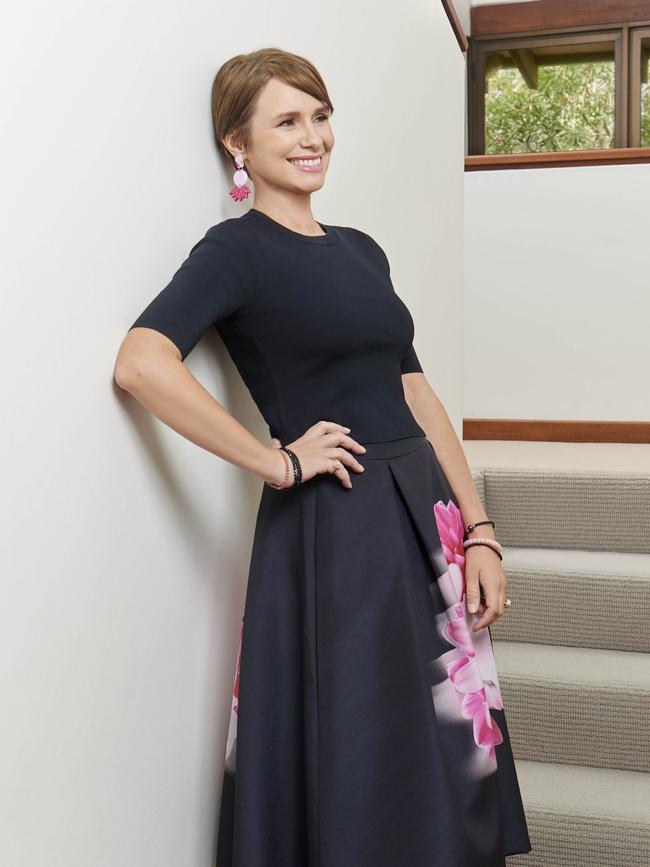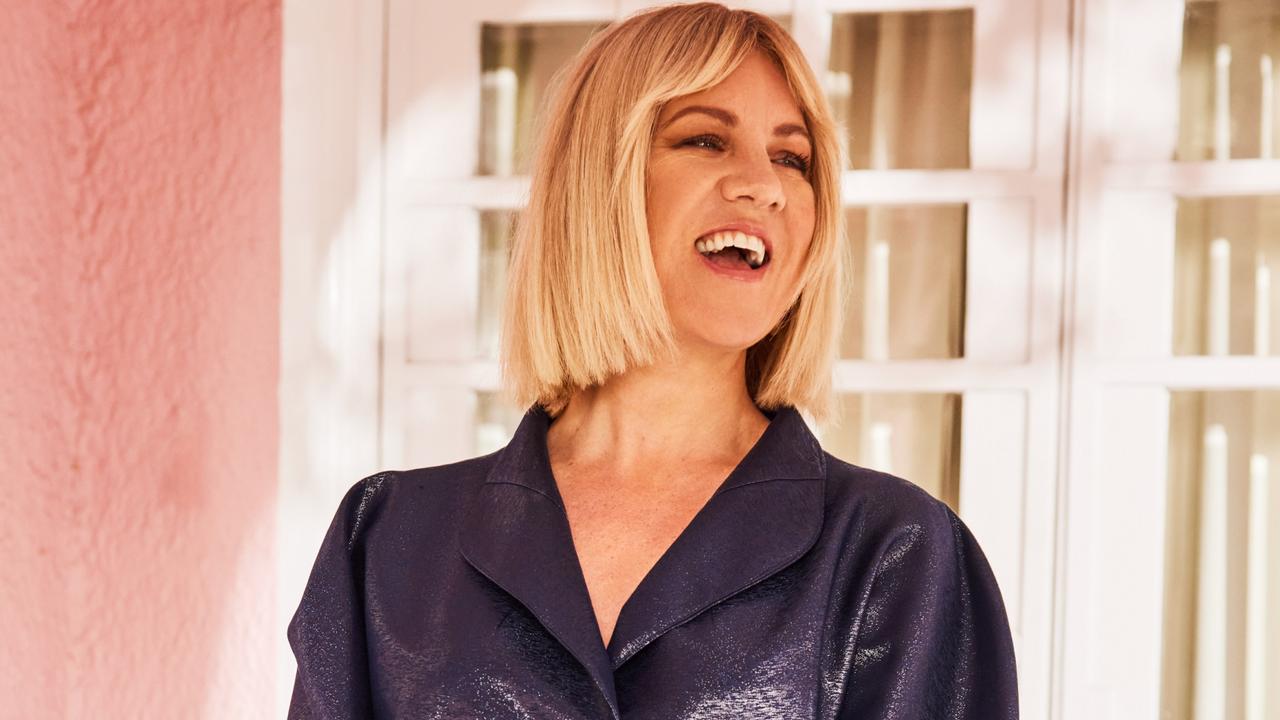Why Tasma Walton and Rove McManus are raising their daughter without gender stereotypes
Tasma Walton and Rove McManus are pushing back against the norm as they raise their eight-year-old daughter, Ruby.

Stellar
Don't miss out on the headlines from Stellar. Followed categories will be added to My News.
With more women in their 40s and 50s hitting their stride on our screens, Tasma Walton believes we’re in the midst of a long-overdue “renaissance” in female storytelling. And just as her new film pushes back against antiquated ideas around women and age, Walton and her husband Rove McManus are also pushing against gender stereotypes when it comes to raising their daughter.
Over the years spent reading bedtime stories to her daughter Ruby, Tasma Walton has changed the gender of the all-too-often male heroes because they were more fun and brave than their stereotypically simpering female counterparts.
Perhaps that’s why Ruby, now 8, was able to spark a colourful family conversation recently when she revealed that a classmate had told her she couldn’t like blue because it was “a boy’s colour”.
Both Walton and her husband, TV presenter Rove McManus, have avoided gender stereotypes in their household, and Ruby’s comment reminded the Blue Heelers and Mystery Road actor why she wishes more would do the same.
“It’s the task for all of us,” she tells Stellar. “In the same way as we’re telling our little girl, ‘That’s silly, isn’t it? Nobody has ownership of a colour. Anybody can like any colour they want.’ The parents of little boys should be having those conversations, too.”
And when it comes to toys, Walton and McManus have always been led by what Ruby wants to play with, regardless of whether it’s marketed to boys or girls.

“It’s a fine line to walk between acknowledging the reality of the ‘guidelines’ we have in place in society,” Walton says, “but also trying to give her the courage and excitement to know that she’s not bound by those perceived rules – that you’re fuller and greater and bigger than that and as long as the choices you make don’t hurt anybody else or any other living thing, then you can do and be whoever you want.”
This isn’t just about empowering young girls like Ruby, either. As an ambassador for Our Watch, which Walton describes as “an organisation set up to look at ways to prevent violence against women and their children”, she says she’s gained insight into the patterns of toxic behaviour that can stem from using seemingly harmless phrases such as “boys will be boys”.
“It’s important for me because I grew up in a household that had domestic violence,” Walton tells Stellar. “So I absolutely know on a visceral level what that experience feels like. There’s a lot of research that clearly shows the drivers of this violence can be an adherence to rigid gender stereotypes.”
Within her own career, Walton, 48, has sought out roles that push people’s expectations about women and age, which is why she says she relished making her latest film, How To Please A Woman, a poignant Australian comedy centred on Gina (played by British actor Sally Phillips), a mother who’s turning 50 and who rediscovers her own identity and passion when she inadvertently starts an escort service.
Walton notes that some of her favourite scenes take place in the changing room after Gina and her friends, including Walton’s character Monique, have their daily ocean swim, when they banter about their personal lives without “fear of being observed or judged or fetishised”.
Related to that, Walton brings up the hit 2021 TV drama Mare Of Easttown, in which Kate Winslet plays complicated police detective Mare Sheehan.
“What I loved about that was there’s a central character who doesn’t have to conform to any sort of strict ideal around beauty, or how she ought to behave,” she says.
“She’s just her own individual person, with all of her flaws, all of her strengths. And that’s just who she is. Whether she’s male or female is almost irrelevant.”
Seeing actors such as Winslet, Nicole Kidman and Olivia Colman hitting their career stride in their 40s and 50s is evidence, Walton says, of a “renaissance that’s happening for storytelling, that finally recognises, appreciates and celebrates women of all ages in all of their complexity, because we do live complex lives.
“We do have a lot of wisdom to give, a lot of life experience to share. So why not have that reflected in our storytelling? And yeah,” she adds, “I think we’re entering a really fruitful period for stories of that kind to focus on characters of that age.”

As well as Walton, the cast of How To Please A Woman includes other familiar Australian faces, including Hayley McElhinney (Doctor Doctor) and Erik Thomson (Back To The Rafters).
While viewers will likely recognise Phillips as the acerbic best friend in the Bridget Jones films, Walton says she didn’t get around to asking the British actor about her time filming the rom-coms alongside Renée Zellweger.
“We talked more about the fact that she’s fluent in Italian and studied literature, so I didn’t have that conversation,” Walton says, laughing at the missed opportunity for some behind-the-scenes insight. “And now I’m kicking myself.”
The new film was shot in Walton’s home state of Western Australia, where the fact it had “cushioned itself beautifully against the pandemic” offered the cast and crew a reprieve from the gruelling lockdowns happening elsewhere in the world, she says, adding how the threat that Covid could at any time shut down production always hung over filming.
“It’s always helpful in very challenging times to look for a silver lining,” Walton adds, revealing that one such perk was that she and McManus, 48, got to spend more time with their loved ones.
“But alongside that, we both lost a lot of work,” she concedes. “We also had all of our friends in the industry facing fundamental challenges to their existence because of it. When you can’t earn money doing the thing that you’re skilled to do, what do you do?”
Before filming How To Please A Woman, Walton and McManus were living in Sydney for the better part of 2020, sharing home-schooling duties and missing their Perth-based family.
The experience prompted the couple to make the decision last year to move their family back west on a more permanent basis “to see how that feels”.
“When your parents are older and you’re concerned for their health in a time of pandemic and you realise that, if something did happen, you probably wouldn’t be able to see them, it made us re-evaluate how we wanted our everyday life to be,” she explains.

Having kept their home in Sydney, the pair are dividing their time between coasts now that borders have re-opened. “We’re very lucky to be able to have freedom of movement,” Walton says.
“And that’s the nature of our work as well. You don’t go to a set office every day. Your work takes you to different places. So that freedom to be able to travel is really important.”
How To Please A Woman is in cinemas from Thursday.
More Coverage
Originally published as Why Tasma Walton and Rove McManus are raising their daughter without gender stereotypes




